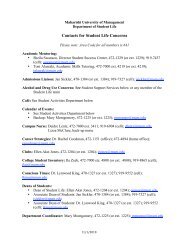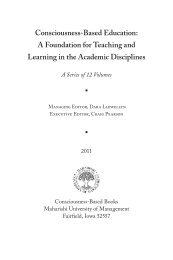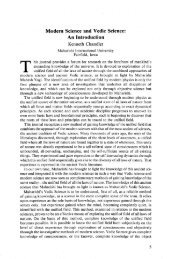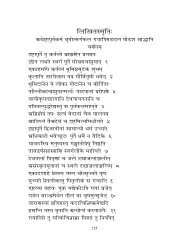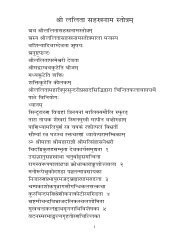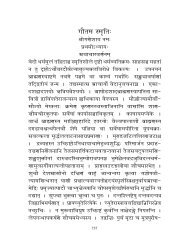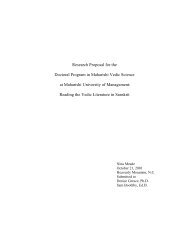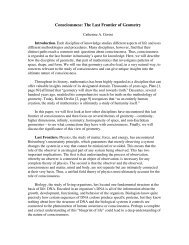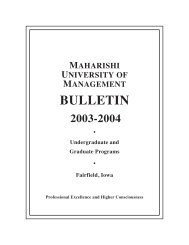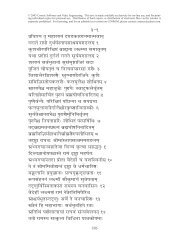The Bhagavad-Gita: A Case Study in Vedic Psychology - Maharishi ...
The Bhagavad-Gita: A Case Study in Vedic Psychology - Maharishi ...
The Bhagavad-Gita: A Case Study in Vedic Psychology - Maharishi ...
You also want an ePaper? Increase the reach of your titles
YUMPU automatically turns print PDFs into web optimized ePapers that Google loves.
MODERN SCIENCE AND VEDIC SCIENCE<br />
mach<strong>in</strong>ery that creates desire—senses, m<strong>in</strong>d, and <strong>in</strong>tellect—so that even while rema<strong>in</strong><strong>in</strong>g<br />
<strong>in</strong> the field of desire, it rema<strong>in</strong>s free from the impact of desire....<br />
Hav<strong>in</strong>g thus far expla<strong>in</strong>ed that the loss of wisdom is due ma<strong>in</strong>ly to the m<strong>in</strong>d's <strong>in</strong>cessant<br />
engagement <strong>in</strong> the field of activity, to desire, the Lord now beg<strong>in</strong>s to describe a way<br />
whereby the subjective aspect of one's life, which is responsible for all desire and activity,<br />
can be <strong>in</strong>fluenced <strong>in</strong> such a manner that, on the one hand, it does not permit desires to overshadow<br />
Be<strong>in</strong>g and, on the other, it br<strong>in</strong>gs fulfillment to them.... (pp. 239-241)<br />
Lord Krishn cont<strong>in</strong>ues:<br />
<strong>The</strong> senses, they say, are subtle;<br />
more subtle than the senses is the m<strong>in</strong>d;<br />
yet f<strong>in</strong>er than m<strong>in</strong>d is <strong>in</strong>tellect;<br />
that which is beyond even the <strong>in</strong>tellect<br />
is he.<br />
(III. 42)<br />
Thus, hav<strong>in</strong>g known him who is<br />
beyond the <strong>in</strong>tellect, hav<strong>in</strong>g stilled<br />
the self by the Self, О mighty-armed,<br />
slay the enemy <strong>in</strong> the form of desire,<br />
difficult to subdue.<br />
(III. 43)<br />
Let him gradually retire through<br />
the <strong>in</strong>tellect possessed of patience;<br />
hav<strong>in</strong>g established the m<strong>in</strong>d <strong>in</strong> the<br />
Self, let him not th<strong>in</strong>k at all.<br />
(VI. 25)<br />
<strong>Maharishi</strong> po<strong>in</strong>ts out that <strong>in</strong> these verses, Lord Krishn describes the mechanics of<br />
experienc<strong>in</strong>g the Self as a process of withdraw<strong>in</strong>g the attention from the senses through<br />
the "subtler" levels of <strong>in</strong>ner experience—the m<strong>in</strong>d, <strong>in</strong>tellect, and ego (<strong>in</strong>dividual self)—<br />
eventually experienc<strong>in</strong>g the Self or pure consciousness (Dillbeck, 1988). Lord Krishn<br />
asserts that <strong>in</strong> this experience of the Self, which is beyond thought, the impell<strong>in</strong>g force<br />
of desire no longer takes attention outward through the senses.<br />
In his commentary, <strong>Maharishi</strong> emphasizes that the process of transcend<strong>in</strong>g described<br />
by Lord Krishn does not require effort or concentration. As quoted previously, Lord<br />
Krishn (II, 40) first <strong>in</strong>troduces the topic of Yog by stat<strong>in</strong>g, "In this (Yog) no effort is lost<br />
and no obstacle exists." However, he also said, as quoted above (II, 43), that desire was<br />
"difficult to subdue." <strong>Maharishi</strong> expla<strong>in</strong>s the resolution of this apparent <strong>in</strong>consistency <strong>in</strong><br />
116



